Novel Enterococcus faecium P2 as a probiotic for mitigating Clostridioides difficile infection
IF 3.5
3区 医学
Q3 IMMUNOLOGY
引用次数: 0
Abstract
Clostridioides difficile (C. difficile) is a well-recognized pathogen responsible for severe intestinal disorders, including pseudomembranous colitis and toxic megacolon. Probiotics have shown considerable promise in the prevention and management of gastrointestinal diseases. In this study, we isolated Enterococcus faecium (E. faecium) P2 from the feces of a healthy child and evaluated its probiotic efficacy against C. difficile infection (CDI) using a mouse model. In vitro assessments demonstrated that E. faecium P2 exhibits high safety, tolerates gastrointestinal stressors, forms robust biofilms, and inhibits both the growth and biofilm formation of C. difficile. In vivo, prophylactic administration of E. faecium P2 prior to CDI onset significantly alleviated intestinal damage, as evidenced by reduced average total clinical scores and lower mortality rates. Furthermore, E. faecium P2 upregulated the expression of intestinal mucosa-associated proteins, including MUC-2 and the tight junction proteins ZO-1 and Claudin-1, indicating a protective effect on the intestinal barrier. E. faecium P2 also modulated the inflammatory response by decreasing pro-inflammatory factors and increasing the anti-inflammatory cytokine IL-10. Fecal microbiota analysis revealed that E. faecium P2 helps restore the microbial balance disrupted by CDI. Collectively, these findings highlight the potential of E. faecium P2 as a probiotic candidate for the prevention of CDI.
新型粪肠球菌P2作为减轻艰难梭菌感染的益生菌。
艰难梭菌(C. difficile)是一种公认的病原体,可导致严重的肠道疾病,包括假膜性结肠炎和中毒性巨结肠。益生菌在预防和管理胃肠道疾病方面显示出相当大的前景。在这项研究中,我们从健康儿童的粪便中分离出粪肠球菌(E. faecium) P2,并使用小鼠模型评估其对艰难梭菌感染(CDI)的益生菌效果。体外评估表明,粪肠杆菌P2具有高安全性,耐受胃肠道应激源,形成坚固的生物膜,并抑制艰难梭菌的生长和生物膜的形成。在体内,CDI发病前预防性给药粪肠杆菌P2可显著减轻肠道损伤,这可以通过降低平均临床总评分和降低死亡率来证明。此外,粪肠杆菌P2上调肠粘膜相关蛋白muc2和紧密连接蛋白ZO-1、Claudin-1的表达,表明其对肠屏障具有保护作用。粪肠杆菌P2还通过降低促炎因子和增加抗炎细胞因子IL-10来调节炎症反应。粪便微生物群分析显示,粪肠杆菌P2有助于恢复被CDI破坏的微生物平衡。总的来说,这些发现突出了粪肠杆菌P2作为预防CDI的候选益生菌的潜力。
本文章由计算机程序翻译,如有差异,请以英文原文为准。
求助全文
约1分钟内获得全文
求助全文
来源期刊

Microbial pathogenesis
医学-免疫学
CiteScore
7.40
自引率
2.60%
发文量
472
审稿时长
56 days
期刊介绍:
Microbial Pathogenesis publishes original contributions and reviews about the molecular and cellular mechanisms of infectious diseases. It covers microbiology, host-pathogen interaction and immunology related to infectious agents, including bacteria, fungi, viruses and protozoa. It also accepts papers in the field of clinical microbiology, with the exception of case reports.
Research Areas Include:
-Pathogenesis
-Virulence factors
-Host susceptibility or resistance
-Immune mechanisms
-Identification, cloning and sequencing of relevant genes
-Genetic studies
-Viruses, prokaryotic organisms and protozoa
-Microbiota
-Systems biology related to infectious diseases
-Targets for vaccine design (pre-clinical studies)
 求助内容:
求助内容: 应助结果提醒方式:
应助结果提醒方式:


